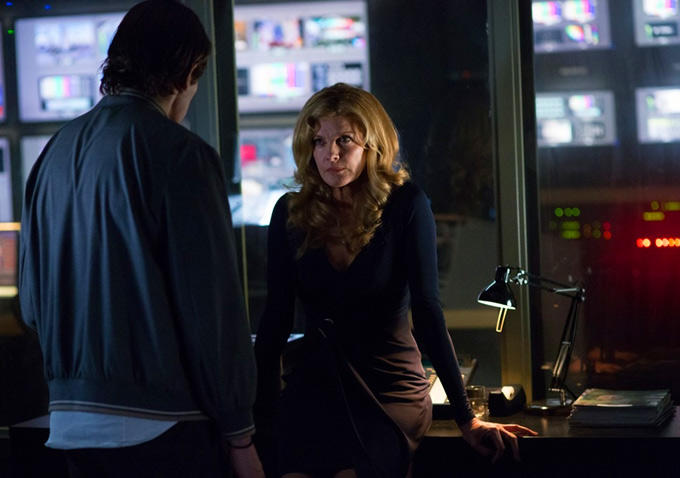REVIEW: 'Nightcrawler'
When movies or TV shows that feature certain professions are released, it’s common for real people who do those jobs to chime in about what the writers get wrong. We’ll often hear from doctors about what emergency rooms are really like, or from astrophysicists about the facts of space travel. And it’s left to us to decide whether the expert reactions ruin the experience. For example, in the case of Neil DeGrasse Tyson’s comments about Gravity, some of them were funny and informative, but I think I enjoyed the movie’s thrills more than finding out that some of them are hogwash.
That being said, when a production set in the journalism world comes out, I always sit a little bit straighter, and cast an extra-sharp eye on the screen. I’m not specifically looking for mistakes, but I can’t help comparing the film or TV series in question to my own experience in the news business. My opinion on it isn’t a foregone conclusion, though – if a movie about journalism can give me good reasons to forgive its occasional misrepresentations of the profession, I’m more than willing to do it.
That’s probably why I was able to so thoroughly enjoy Dan Gilroy’s new film Nightcrawler, despite its occasional implausible moments. If we can accept a haunting character like Lou Bloom (Jake Gyllenhaal) and his morally bankrupt means of news gathering, then the events that unfold around him shouldn’t feel like an untrue portrayal of the industry. Instead, the world of Nightcrawler is like a weird doppelgänger of our own – uncannily similar, yet slightly out of step with us. The movie takes news production to an extent (we hope) isn’t possible in real life, and so it underscores the consequences of the blood-soaked, sensationalist news coverage that we all seem bent on consuming.
Gilroy (the brother of Bourne screenwriter Tony Gilroy) doesn’t drop us right into a newsroom. The film opens with Lou, scrounging for materials to sell at a scrap yard for cash. We realize pretty quickly that Lou is some kind of sociopathic drifter, though he has such an eloquent grasp of job-recruitment-speak that he could probably fool an entire HR department into making him their CEO. As he slinks into Los Angeles, however, he happens upon the scene of a violent car accident, and sees that there’s money to be made as a freelance videographer – one who sells gory footage to cable news shows.
Lou partners with Nina (Rene Russo), a hard-nosed producer at one of the lower-ranked shows, and soon builds a reputation as someone who will stomp mercilessly on journalistic ethics (and the law) if it means getting to a crime scene first and getting the best shots. Lou takes “run and gun” video production almost to its literal extreme, and Nightcrawler soon asks whether Lou will start instigating crimes so he can capture the most dramatic footage.
Ahead of Nightcrawler’s premiere at TIFF (where I first saw the film), Gyllenhaal revealed in an interview that to play Lou, he thought of the character as a coyote, a wiry scavenger that wanders into civilization one night and finds a place waiting to be exploited. It’s an evocative set-up for a movie, and an image that the more cynical among us would instinctively apply to some journalists, especially those who seem to get a rush from blasting human tragedy over the airwaves.
The idea of a journalist who goes to the darkest side of “doing anything for the story” is such a visceral experience for anyone who knows the business. Compare Gilroy’s film to Michael Mann’s The Insider; there, Al Pacino plays a reporter who sticks to a noble cause, doggedly pursuing an impossibly powerful opponent. In Nightcrawler, we get the other side of the spectrum; a videographer who goes so far as to arrange dead bodies for a better shot, or who hides information from the police so he can anticipate the suspect’s next move, and be there to record it.
The prospects are chilling, but Gilroy is deft enough not to hit us over the head with some sort of allegory. I can’t decide whether Gilroy is outwardly trying to weave a cautionary tale about journalism, or whether he simply wants to tell a spooky story with some real-world DNA - and that’s probably a good thing.
Visually speaking, I’m leaning toward the ghost-story approach: the film is wrapped in dark shadows, and Gyllenhaal materializes from them, his eyes seemingly popping out of his head (the result of the intense weight loss the actor undertook for the role). Even if Lou’s behavior doesn’t give you the ethical heebie-jeebies, the look of the film and Gyllenhaal’s powerful performance ought to get you shivering.
Nightcrawler builds up to a climactic car chase that happens to be one of the best I’ve seen in a while (partially because Lou isn’t trying to escape something; he’s trying to stay bumper-to-bumper with the action) but it does push the boundaries of common sense. After that, the energy of the movie drops off, and the ending didn’t give me the knockout punch I was looking for. That aside, Nightcrawler still makes a strong impression. It works like a conventional thriller, but it packs in enough criticisms of 24-hour TV news that it elevates itself beyond mere entertainment, and may get you to think twice before you click on the next "bleeding lead" story.
Nightcrawler gets three and a half stars out of four.
What did you think of Nightcrawler? Were you drawn in by Gyllenhaal’s performance and the critique of TV news? Or did it all seem too creepy and unrealistic for you? Join the discussion in the comments section, and if you liked this review, share it with your friends and followers!



